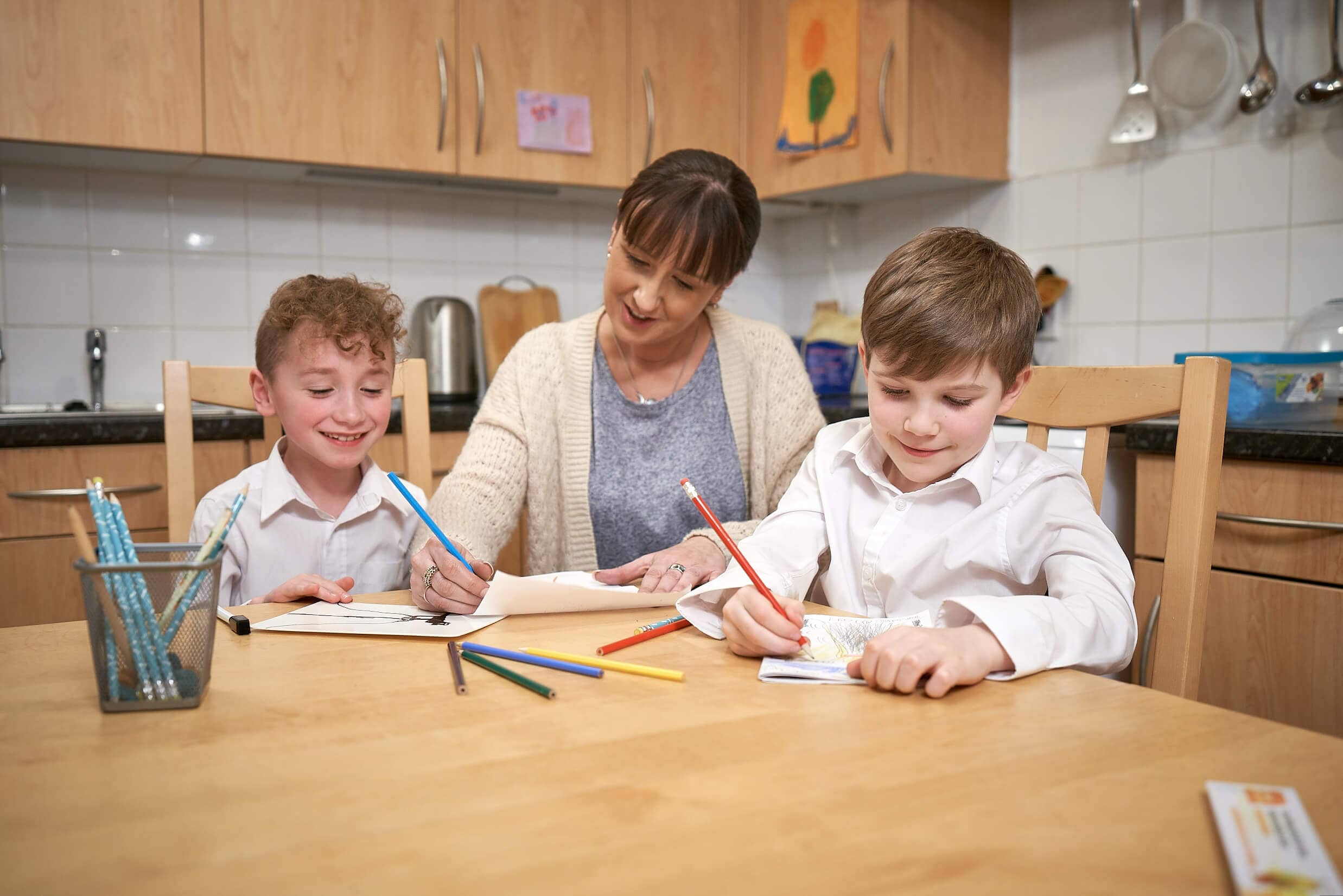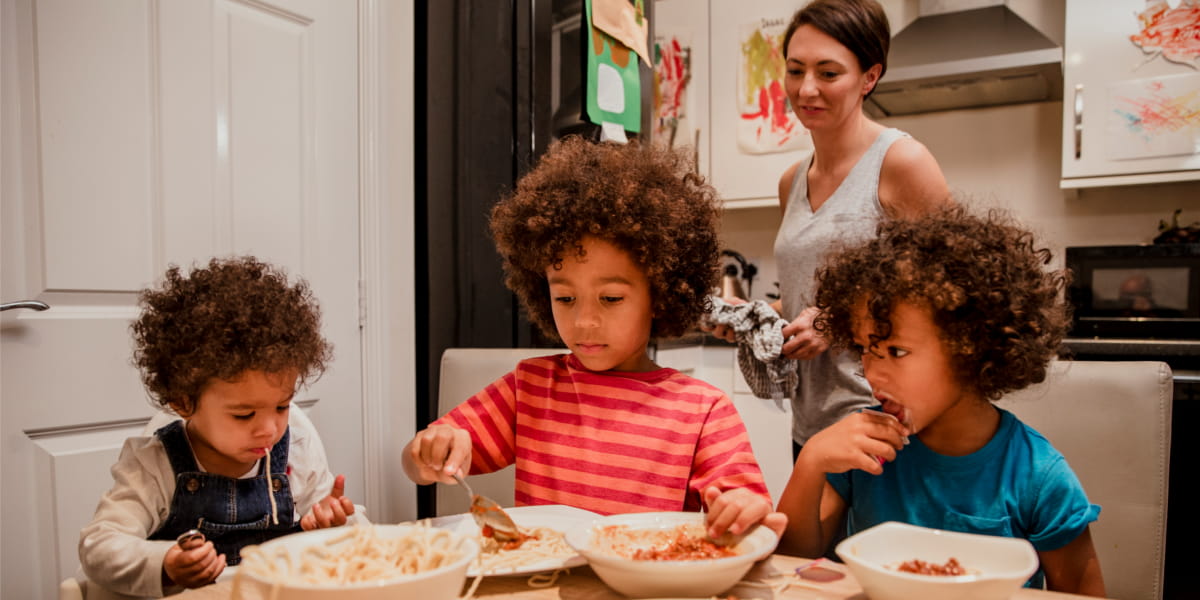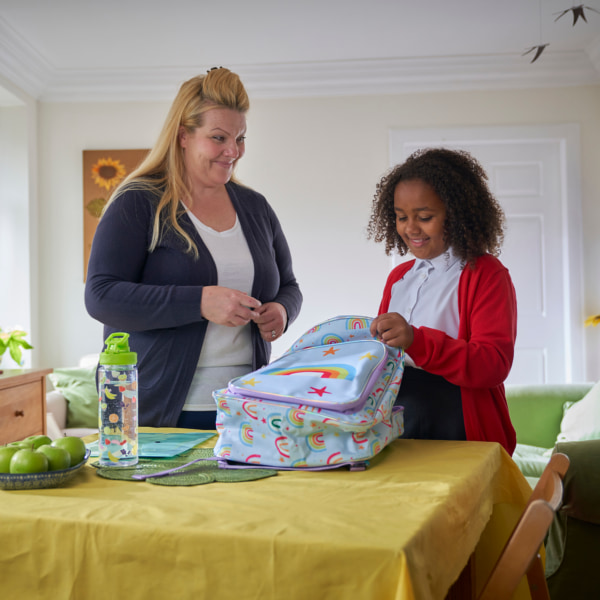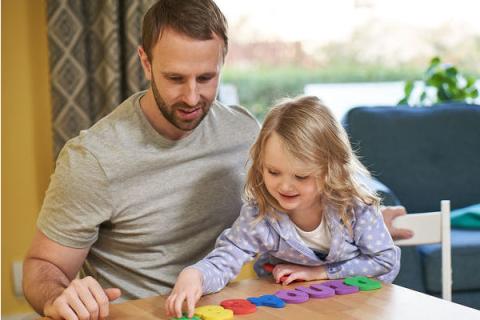Whether it’s getting the little ones to nursery, the bigger ones to school, or dealing with tears at bedtime, daily life can be tricky. But there are plenty of little things we can do everyday to make life that wee bit easier. By making some simple changes to your daily routine you can help make family life go a bit more smoothly.
Some benefits of a regular routine
- Knowing you’re ready for the day ahead helps reduce stress and means you can make more time to have fun with your family.
- Kids like it when life is predictable. So if they know how the day is going to go and there will be no surprises, they will be happier (and hopefully better behaved!)
- You can avoid arguments because the big decisions for the day are already made, and your kids will know what to expect. For example, if they know that 8pm is always bedtime during the week, they’ll be less likely to nag you to stay up later.
- Regular mealtimes and nap times help avoid kids getting cranky due to tiredness and hungry tummies.
- Regular mealtimes help older kids organise their lives too, and make them less likely to be late for tea or their friends!
- Having a routine reduces anxiety by removing uncertainty from the day.
- A clear structure to the day means kids always know when bedtime’s coming up and regular sleep patterns help us all sleep better.
Making your daily plan
Knowing where to start can be tricky. But working together as a family to come up with a flexible and simple plan will help everyone’s wellbeing, and make the day easier. Knowing how the day will pan out will help younger and older kids feel secure and will boost their confidence too.
Chances are you’re already doing lots of these things – you may not even realise!
1. Add choices for your kids
Kids are more likely to kick up a fuss if they feel like they can’t control anything themselves. It’s a good idea to offer them some choices during the day. This will help them feel part of the decisions being made to family life, rather than having a new schedule forced on them. Here are some ways this can work:
Tip #1: Mealtimes

At breakfast, you could ask them if they want to pour the milk themselves or want you to do it. Either way they still get milk. But it feels more like free choice. For lunch or dinner, you could have two options and ask them which meal they want.
Whatever they pick, you are already prepared, but they get to feel in control. You can even give them a choice of two new foods to get them to try new things. Older kids can take the lead when it comes to cooking a meal (and younger ones can help out, even if it might get messy!)
Tip #2: Getting ready
It can be a big job to get young children dressed in the morning. Giving them a little control over what they wear can help. Try giving them the choice of two outfits. You control their options but they make the decision. And whatever they choose, you’ll have a fully dressed child at the end of it!
Tip #3: Bedtime

Letting your wee ones pick their bedtime story is another easy win (even if you do end up reading the same thing every night, this can be really good for little minds). You can also try letting older kids read to their little brother or sister to end their day.
2. Working together as a family
Letting everyone have input into any daily routine will help your family feel more involved and they’ll be more likely to stick to it if their ideas have been included. Here are some ways to get them working with you rather than against you:
Tip #1: After school plan

This part of the day is all about your child. So it’s a great idea to get them to help. For example, try letting them decide when they want to do their homework. Maybe they’d like to relax first, or have a quick snack for energy, or even do it after dinner. With your help they can learn how to make a plan and stick to it.
Tip #2: Cooking together
Having fun with your mini chef at mealtimes is a great way for them to learn teamwork. They’ll also get more confident with skills like counting and weighing things. And it’s a great chance to give them some praise. Cooking together even helps avoid arguments about what they want to eat that day!
In this short film, Scotland’s National Chef, Gary Maclean (Dad of 5 – 3 older ones and 2 wee ones!) shares his top tips on how to involve and empower kids around mealtimes.
Tip #3: Walking to school
If you walk to school with your wee ones, try asking them which way to go. You can talk to them about landmarks on the way, like a shop or a post box. This can help their sense of direction, and giving or following instructions. Once they’ve settled into secondary school, you can let them go on their own, or maybe with their siblings.
Tip #4: Decide on the fun stuff together

Teamwork isn’t just about getting chores done - how about deciding as a family what you’ll do for fun as well? For example, you could all agree on what you do on the weekend. Visit a softplay centre, have a takeaway, go to the cinema - it could even be planning an impromptu party!
3. Make a plan that builds trust
If your child always knows what’s coming next they’ll feel less anxious and more confident. This makes life easier for you too. If the kids are happy, you won’t need to deal with a sudden tantrum or a grumpy teenager (hopefully). Here are some tips for a consistent plan that builds trust:
Tip #1: Praise or correct them consistently
When your child follows the plan, praise them every time, for example if they put their toys away or do their homework without being asked. They will happily stick to the routine if they know it gets them positive attention. And if they do go off track, try to correct them in a consistent way too. It’ll help them remember more easily in future.
Tip #2: Keep the order consistent

Weekdays usually mean things like getting ready and going to school, homework, dinner time and bedtime. Try to do these the same way every day. You can be more flexible at the weekend or during school holidays when you have more time to spare.
Tip #3: If you change, tell them why
We all know how curious kids are. Some of them go through a phase where the only word they seem to know is “why?”. If you ever need to change the routine, be consistent in how you change it. Giving them a clear reason so they can understand and feel comfortable with the new plan is a great way to get them to agree without a fuss.
Tip #4: Give them things to look forward to
Plans are not just about getting the kids to school and into bed on time. They can be full of fun stuff too. The week might go a lot smoother if your kids can trust that Friday night is pizza night, or Sunday is a roast dinner with granny and grandad.
4. Make a routine that boosts your kids’ confidence
We all like feeling in control, even when we’re young. Try letting your kids take charge of certain things. It lets them learn new skills and have fun at the same time. And giving them chances to succeed now will give them more confidence to bounce back if they fail in the future. Here are some tips for getting the kids to take on new tasks and believe in their abilities:
Tip #1: Involve them in family decisions
It’s good to include your kids when planning. But if it’s something that directly involves them, try letting them make the final decision. It will encourage them to follow what’s going on. And seeing the result of their decision will help them make more choices in future.
Tip #2: Do it with them but not for them
Sometimes kids just can’t get the job done. But try to help them rather than taking over. If you’re posting a letter and they can’t reach the post box, pick them up instead of taking the letter from them. With older children, try helping them work out how to solve a problem rather than telling them what to do. Taking over teaches them to leave tasks for someone else to do. But helping them teaches kids’ problem solving and teamwork.
Tip #3: Celebrate all their wins, big and small
Whenever your child completes a task or sticks to the schedule, make them feel great about it. This will boost their self-esteem, and give them the confidence to try new things. And by developing their self-respect, they learn to respect and value others too. Including us as parents.
5. Make a plan that helps everyone feel secure
Don’t worry, you don’t have to change your whole life overnight to make things run more smoothly! The aim of adding some routine into your days is to help your kids feel more secure and allow life to feel a bit more predictable. Here are some tips to get you started.
Tip #1: Don't change everything at once
You don’t need to create a new routine all at once. Introducing one new habit at a time will stop you and the kids from getting overwhelmed.
Tip #2: Give yourself enough time
Time pressure can cause stress for kids and can make any plan break down. Try a practice run so you understand how long the kids need to do different tasks, like getting everyone dressed for school or how long it takes to walk to their swimming class. As they get better at each task, you might find you have time to spare and less of a stress.
Tip #3: Explain what's going on
The more your kids understand what the routines are, the happier they’ll be doing them or helping out. Knowing what is expected will also lead to fewer arguments too. Be specific when you’re letting the kids know what they need to do. For example, instead of saying “You need to hoover today”, you could say “Please hoover the hall and sitting room today so that we have nice clean floors, and put the hoover away when you finish so no one trips over it”.
Tip #4: Get the kids involved
If the kids get involved in shaping the plan, they’re far more likely to stick to it. For example, you could let them choose which household chores they do, and when they do them. Do they prefer to have breakfast in their pyjamas and then get dressed or the other way round? And it’s not just about day to day things - why not let them choose which night is set aside for pizza and movies, or where you all go on a Saturday afternoon – park or swimming?
Tip #5: Write it down
Help keep things in mind for you and the kids by writing down the things they need to do each day and putting them where the family can all see them. For younger kids you can leave notes in different places, like a note in the bathroom reminding them to brush their teeth. Pictures can help too. Just try to list tasks in little blocks (no more than 3 to 5).
Tip #6: Help kids make good habits
Eventually, any new routines will become an automatic habit for your wee ones. You won’t even need to ask them. But it takes time. In the early days they’ll forget things, or struggle with certain tasks. Just keep gently reminding them and make sure to praise the small improvements.
Tip #7: Make time for fun
Don't forget to schedule in fun too. And the better you plan the boring stuff, the more time there’ll be for fun! Make sure you build in time to spend time together as a family doing something you all enjoy.
This could be a really small thing like having a hug on the settee every evening, or something bigger like having a film night on Fridays. We have lots more suggestions for fun things to do for the family at home here.
Top tips from parents
Daily life can be stressful but there are lots of simple things we can do every day to help make family life go a bit more smoothly. Thank you to these lovely people for sharing their wonderful top tips with us.
 Activities & Play
Activities & Play Behaviour
Behaviour Childcare
Childcare Development & Growing Up
Development & Growing Up Family, Friends & Relationships
Family, Friends & Relationships Feeding Your Baby
Feeding Your Baby Food & Eating
Food & Eating Health & Safety
Health & Safety Mental Health & Wellbeing
Mental Health & Wellbeing Money & Work
Money & Work Online Behaviour & Safety
Online Behaviour & Safety Pregnancy & First Days
Pregnancy & First Days School & Education
School & Education Sleep
Sleep








 Family, Friends & Relationships
Family, Friends & Relationships
 Mental Health & Wellbeing
Mental Health & Wellbeing